Hollow Point Bullet - A Comprehensive Guide For First Time Buyers.
What Is a Hollow Point Bullet? How It Is Different From Other Bullet Types.
If you are a new gun owner, a common question you will be asked when buying ammo is, "What type of ammo will you prefer?
They will offer you various bullet-type options, like hollow point bullet, full metal jacketed, jacketed hollow points & many others.
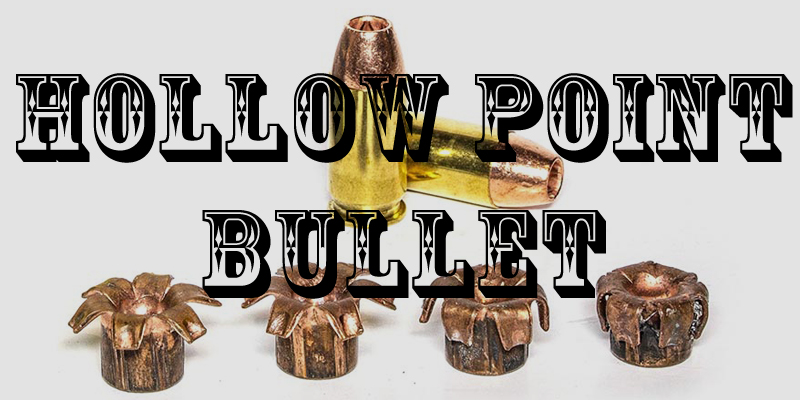
Every type of ammunition has its uses.
Previously we have covered the topic of 9mm Jacketed Hollow Point Vs. 9 mm Full Metal Jacket.
In this article, we will discuss hollow point bullets. What are its uses and advantages & how is it different from other types of ammunition?
Let's get started.
What’s A Hollow Point Bullet?
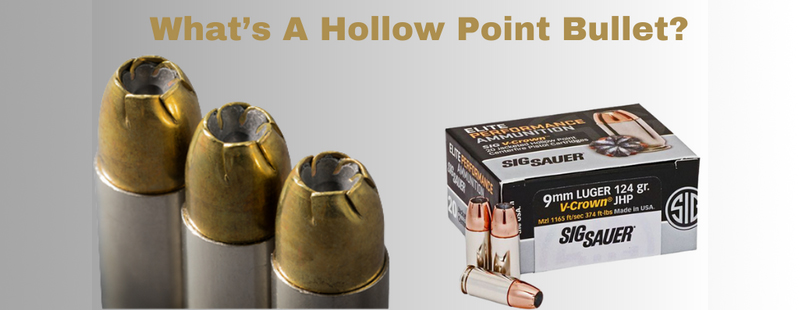
Hollow Point bullets, as the name suggests, have an open tip which causes them to expand upon impact. This creates a larger surface area on impact. They were called "express bullets" because they were able to travel at a faster velocity compared to full metal jacket ammo.
Hollow-point bullets are easy to recognize. They have a distinguishing indent, dip, or cup-like formation at the bullet's tip.
Hollow point bullets are designed for personal defense, home defense, and hunting. The hollow tip of the bullet expands on impact, causing more damage to the target. This makes this ammunition more effective at stopping an attacker or taking down a game.
However, hollow point ammunition can also be more likely to ricochet than FMJ bullets. That's why it's essential to choose the right size and weight for your gun and practice with them before using them in a real-world situation.
Hollow points can be lead bullets that are jacketed in a harder metal, or they can be made of a single material. The unique characteristic of hollow point bullets is they "mushroom" or "bloom" outward once they hit their target.
Types Of Hollow Point Bullet
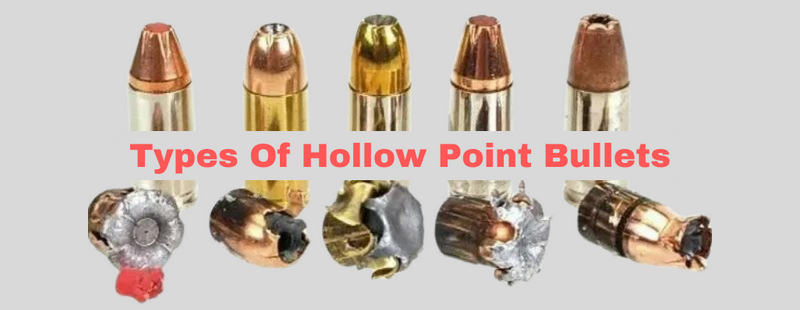
Hollow point bullets come in different types depending on their intended use. Here are some common types:
- Jacketed Hollow Point (JHP): These are the most common type of hollow point bullets and are often used for self-defense and law enforcement purposes. They have a lead core that is surrounded by a copper jacket, which expands upon impact to create a larger wound cavity.
- Boat-Tail Hollow Point (BTHP): These bullets have a tapered base that helps to increase accuracy and reduce drag, making them a popular choice for long-range shooting.
- Wadcutter Hollow Point: These bullets are flat on the front and have a hollow point in the center, which helps to create a clean, round hole in the target. They are often used for target shooting and competitions.
- Lead Hollow Point: These bullets are made entirely of lead and have a hollow point at the tip, which helps to increase expansion upon impact. They are often used for hunting small game.
- Frangible Hollow Point: These bullets are designed to break apart upon impact, reducing the risk of ricochets and over-penetration. They are often used in indoor shooting ranges and close-quarters training scenarios.
Things To Know About Hollow Point Bullets
Before buying hollow point bullets, there are many interesting things you must know. What are the facts, uses, advantages & how it is different from Full Metal Jacketed?
How Hollow Point Bullets Are Different From Regular Bullet Types?
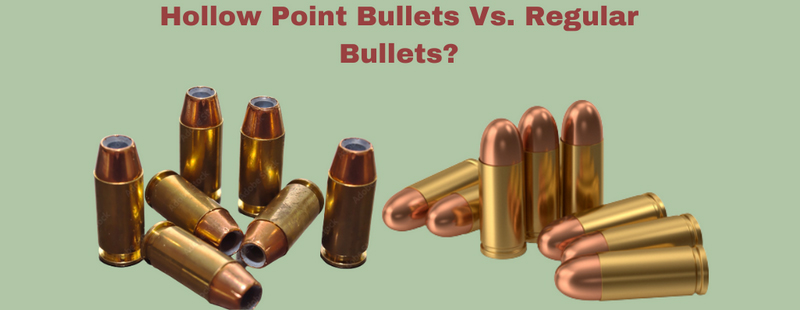
Let's know how hollow point bullets are different from other bullet type:
- Design: Hollow point bullets have a concave shape at the tip, which causes them to expand upon impact. This design helps to transfer more energy to the target and also reduces the risk of over-penetration.
- Purpose: Hollow point bullets are commonly used in self-defense situations because of their ability to expand upon impact and cause greater damage to the target. They are also used by hunters because they are less likely to pass through an animal and cause unnecessary harm to the environment.
- Legal status: The use of hollow point bullets is legal in most countries for both self-defense and hunting purposes. However, some jurisdictions may have restrictions on the use of hollow point bullets by law enforcement or military personnel.
- Terminal ballistics: The expansion of a hollow point bullet causes it to create a larger wound channel than a non-expanding bullet, which can lead to more effective incapacitation of the target. This effect is known as terminal ballistics.
- Accuracy: Some shooters may experience decreased accuracy with hollow point bullets compared to full metal jacket (FMJ) bullets. This is because the hollow point design can cause the bullet to become unbalanced in flight.
- Cost: Hollow point bullets are typically more expensive than FMJ bullets due to their design and the materials used to manufacture them.
- Variations: There are different variations of hollow point bullets, such as jacketed hollow points (JHP) and bonded hollow points. JHP bullets have a jacket that surrounds the lead core, which helps to control expansion and penetration. Bonded hollow points have a bonded jacket that is designed to prevent separation of the jacket and lead core upon impact.
What Is A Hollow Point Bullet For (Uses)?
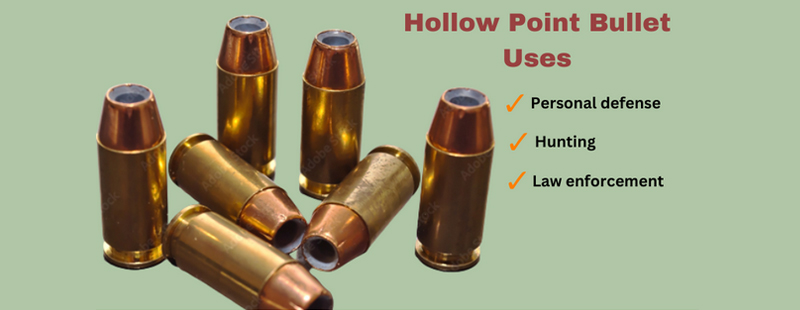
Hollow point ammunition is a type of bullet that features a hollow cavity at the tip, which allows it to expand upon impact. This type of ammunition is commonly used for personal defense, hunting, and law enforcement purposes.
Here are some common uses for hollow point ammo:
Personal defense
Hollow point ammunition is a popular choice for individuals who carry firearms for personal defense. When a hollow point bullet strikes its target, the cavity at the tip causes the bullet to expand and create a larger wound channel, which can be more effective in stopping an attacker than other types of ammunition.
Hunting
Hollow point ammunition is often used by hunters, especially for smaller game like varmints, rodents, and small game. The expansion of the bullet upon impact can cause more damage to the animal, leading to a more humane and effective kill.
Law enforcement
Many law enforcement agencies use hollow point ammunition in their firearms, as it can be more effective in stopping an attacker and reducing the risk of overpenetration, which can cause collateral damage to innocent bystanders.
It's worth noting that hollow point ammunition is generally not legal for civilian use in some countries and jurisdictions, so it's important to check the laws in your area before purchasing or using this type of ammunition.
Pros & Cons Of Hollow Point Bullet
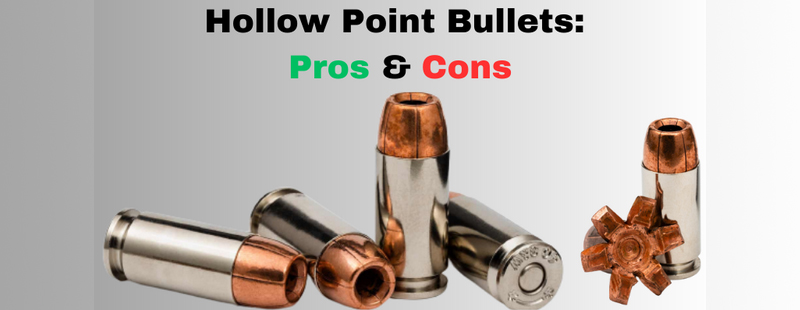
Advantages of Hollow Point Bullets
Hollow point bullets were designed to expand once they hit their mark for two main reasons:
Hollow point bullets are a type of ammunition that is designed to expand upon impact, creating a larger wound channel than other types of bullets. This design offers several advantages:
- Increased stopping power: The expansion of the bullet upon impact can create a larger wound channel, which can result in more immediate incapacitation of the target. This makes hollow point bullets an effective choice for self-defense situations.
- Reduced over-penetration: Hollow point bullets are less likely to pass through the target and continue traveling, reducing the risk of hitting unintended targets or causing collateral damage.
- Greater accuracy: Due to their design, hollow point bullets tend to be more accurate than other types of ammunition, as they are less affected by wind resistance and other factors that can affect trajectory.
- Reduced risk of ricochet: Hollow point bullets are less likely to ricochet off hard surfaces, such as concrete or metal, reducing the risk of injury to bystanders or law enforcement officers.
- Improved reliability: Hollow point bullets are less likely to jam or misfire than other types of ammunition, which can be especially important in life-or-death situations.
- Reduced recoil: Due to their design, hollow point bullets may have less recoil than other types of ammunition, which can make them easier and more comfortable to shoot.
Cons Of Hollow Point Bullet
While hollow point bullets have advantages in certain situations, they also have some disadvantages, including:
- Price: Hollow point bullets are generally more expensive than other types of ammunition, which can make them cost-prohibitive for some shooters.
- Legal Restrictions: Some states or localities may have restrictions on the use of hollow point bullets, which can limit their availability and use.
- Performance in certain conditions: Hollow point bullets may not perform as well in certain environmental conditions, such as extreme cold or heat, or in situations where the target is wearing heavy clothing.
Hollow Point Bullet Effects On Impact
These rounds are preferred by hunters and in self-defense situations because they expand upon impact. This is because the hollow point bullet has a cavity in the center of the bullet that allows it to deform and expand upon impact.
When a hollow point bullet hits its target, the bullet's cavity allows it to expand and transfer energy to the target. This energy transfer can result in more significant tissue damage and blood loss, making the bullet more effective in stopping an attacker or animal.
Additionally, the bullet's expansion can help prevent over-penetration, which is when a shot passes through its target and potentially endangers bystanders or damages property behind the target.
It's always important to practice good marksmanship and choose appropriate ammunition for your firearm and intended use. However, it's worth noting that the effectiveness of a hollow point bullet can be affected by several factors, including the caliber of the bullet, the velocity at which it's fired, and the distance from which it's fired. In some cases, hollow point bullets may not expand as designed or fail to penetrate deeply enough to be effective.
Are Hollow Point Bullets Legal Or Not?
Yes, for the USA, hollow-point bullets are legal. Except for New Jersey, a USA civilian can own hollow-point bullets in every state. In New Jersey, civilians can have hollow-point bullets, but they can only use them to defend their homes or hunt.
How Hollow Point Bullets Are Different From Full Metal Jacketed?
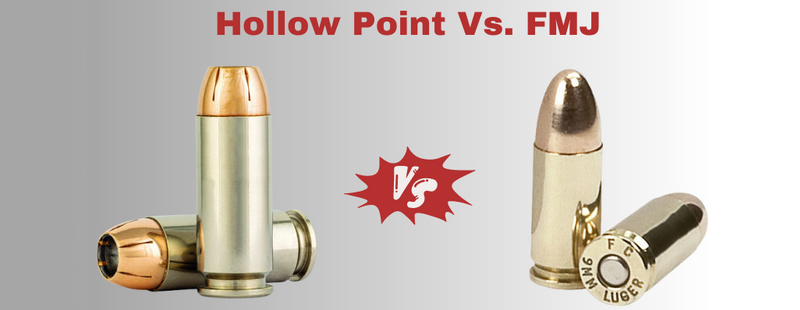
Hollow points and full metal jacket (FMJ) ammo are two of the most common types of bullets in the world. Both of them are better options for different applications. Let's discuss what is the main difference between these two popular bullet types.
Hollow Point Vs Full Metal Jacket
Hollow point bullets
As we discussed above Hollow point bullets (HP), have a cavity or "hollow point" at the tip of the bullet, which causes it to expand upon impact with a target. This expansion creates a larger wound channel . This helps to increase the stopping power of the bullet & make it more effective for self-defense and hunting. The expansion of the bullet also reduces the risk of over-penetration, which can be a concern in certain situations.
Full metal jacketed)
On the other hand Full metal jacketed bullets (FMJ) are typically made with a lead core that is encased in a harder metal, such as copper or brass, which completely covers the bullet. This creates a smooth and consistent surface on the outside of the bullet, which helps it travel straighter through the air and penetrate targets more effectively. FMJ bullets are often used for target shooting, training, and military applications.
Now we will differentiate both for self-defense, target shooting, range practice, hunting, quick feeding, and more ammo usage.
- Self-Defense: FMJ ammunition is not considered a good option for self-defense because of the risk of the bullet hitting an unintended target. It is a small arms projectile that can be used in concealed carry weapons. Hollow-point bullets are better suited for target shooting and self-defense situations. So always use Hollow Point ammo for self-defense.
- Shooting & Rang Practice: Full metal jacket ammunition is suitable for shooting and shooting. Because full metal jacket cartridges are cleaner and stronger than hollow point cartridges, thus, there is no risk of unintended impact further down the range.
- Hunting: When it comes to hunting, hollow point bullets are a better option than FMJ cartridges. FMJ ammo has excellent ballistic performance and does not lose the accuracy and speed of your weapon. The hollow point is primarily used for long-range big game hunting, as it expands on impact and sends the expanded bullet deep into the target in the hope that it will instantly kill or incapacitate.
Final Words
So, after a long discussion we can say that hollow point bullets are one of most popular bullet types used by gun owners.
Hollow point bullets offer numerous benefits over traditional full metal jacket bullets. They expand on impact, delivering more energy to the target and creating a larger wound channel.
This results in faster incapacitation and a reduced risk of over-penetration, which can lead to collateral damage.
While hollow point bullets are more expensive than FMJ rounds, they are a worthwhile investment for anyone who values accuracy, stopping power, and safety.
If you're in the market for ammunition, consider giving hollow point bullets a try and see the difference for yourself.
Just remember to check local laws and regulations before purchasing, as hollow point bullets may be restricted in some areas.

